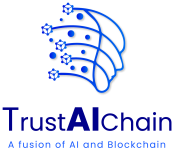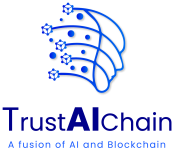Technology and gaming have always been at the forefront of innovation, advancing how we play and engage with digital assets and value. Blockchain technology has been exponentially introduced into the gaming industry in recent years, altering the notions of digital ownership, in-game economics, and security. But great invention often brings excellent challenges, security chief among them. This is where blockchain security with AI enhancements comes into play, providing an advanced defense against an ever-changing array of cyber threats. This thorough investigation clarifies AI-enhanced blockchain security’s significance, mechanisms, and effects in the gaming industry.
The gaming industry has entered due to the advent of blockchain technology, which serves as the foundation for features like transparent player-driven economies, immutable ownership of in-game goods, and decentralized gaming experiences. This technology allows gamers to trade and earn real-world value for their in-game accomplishments. Still, it also draws the attention of hackers who want to exploit system flaws to make money. AI is revolutionizing the security of blockchain technology. AI can detect abnormalities, anticipate possible threats, and automate the security procedures required to reduce these risks before they materialize into actual breaches because of its capacity to handle and analyze enormous amounts of information in real time.
This blog post examines the importance of this integration and its effects on the gaming industry.
Blockchain’s Ascent in the Gaming Industry
The gaming industry has seen a shift to blockchain technology, which makes transactions safe and transparent and opens new doors for developers and players. Blockchain technology has brought a degree of security and reliability to gaming economies that were previously unreachable, from enabling the transfer of in-game assets to guarantee their integrity. However, as blockchain-based gaming platforms increase, they also become easier targets for cyberattacks, which calls for sophisticated security measures.

Different Views Across the Society
Optimism and Excitement: Many people think using blockchain technology and artificial intelligence in gaming security is a significant improvement. Technophiles and enthusiasts frequently highlight the advantages, like better gaming experiences, more security, and democratizing digital asset ownership.
On the other hand, some people express worry or doubt regarding these technologies. The fear of losing one’s job to automation, privacy, ethical concerns with AI, and the environmental effects of blockchain technology are just a few of the worries. Concerns exist over these technologies’ intricacy and potential for abuse, which could exacerbate online fraud.
Uncertainty and Indifference: Some people may not comprehend or believe that AI-enhanced blockchain security will affect their daily lives, which could be why they are indifferent or uncertain. This group may wait until the technology’s effects become more apparent before openly supporting or opposing it.
Crossing the Divide: From Doubt to Belief
Resolving the apprehensions and informing the general audience to promote acceptance and constructive interaction with AI-powered blockchain security in gaming is critical. Here are a few tactics:
Improved Openness and Learning: The moral application of AI and the current environmental initiatives should be included in education, such as creating easily comprehensible materials that elucidate the functioning of AI and blockchain, namely in augmenting security and gaming experience, which can help deconstruct these technologies.
Ethical and Sustainable Development: Privacy, security, and environmental impact concerns can be addressed by highlighting the dedication to ethical AI development and sustainable blockchain processes. It includes implementing green blockchain technology and developing moral standards for the application of AI.
Policy Development and Regulation: Establishing transparent guidelines and standards for the moral use of AI and sustainable blockchain practices in collaboration with legislators can serve as a foundation for responsible innovation and boost public confidence.
How It Operates
AI has shown itself to be a strong ally in enhancing blockchain security in the gaming industry. AI systems can quickly analyze massive data sets to identify and promptly stop security breaches. By anticipating new threats and identifying established ones, this proactive approach to security adjusts to the always-shifting cyber threat landscape. AI systems trained on a dataset of typical transaction patterns can identify anomalies in real time, alerting users to possible fraud or security risks. Several methods are used by AI-enhanced blockchain security to protect gaming ecosystems.
Anomaly Detection: Artificial intelligence algorithms closely monitor blockchain transactions to spot any unusual patterns that can point to fraud. It allows for the prompt detection and elimination of any risks.
Smart Contract Vulnerability Scanning:Since many blockchain-based games rely on smart contracts, AI tools may examine these contracts for vulnerabilities or potential exploits that hackers might use, ensuring they are fixed before release. AI technologies automatically audit smart contract codes for vulnerabilities. This reduces the possibility of exploits that could damage the blockchain. Smart contracts are self-executing contracts with the agreement’s conditions explicitly encoded into their lines of code.
Phishing Detection:AI can detect phishing attempts by examining communications within gaming platforms. It helps shield players from scammers who try to take their digital assets. AI may keep an eye out for indications of phishing scams by monitoring communication channels within gaming platforms; this prevents consumers from falling for dishonest attempts to steal digital assets or sensitive information.
For the gaming business, integrating AI with blockchain security has several benefits.
Enhanced Security: By making blockchain transactions more secure, AI’s predictive powers also make gaming systems less vulnerable to cyberattacks.
Better User Experience: Players may experience a safer gaming environment, which fosters greater trust and participation by reducing the chance of fraud and other security issues.
Operational Efficiency: By using AI to automate security monitoring, creators can focus on making and refining games instead of having to oversee the process manually.
Robust Security: Threats may be quickly detected and handled thanks to improved detection capabilities, preserving the blockchain’s integrity.
Increased User Confidence: Players are more inclined to participate and invest when they know the platform has state-of-the-art security procedures.
Operational Efficiency: Developers and operators may devote more resources to innovation and user experience since AI will handle the heavy work in security monitoring.

Upcoming Prospects and The Path Ahead
The sophistication of cyber-attacks will rise with the gaming industry’s continued growth. Blockchain technology combined with AI offers a flexible and dynamic security solution that can change to keep up with these threats. We may anticipate even more cutting-edge AI uses in blockchain security shortly, which will help further protect the virtual gaming industry from numerous cyber threats.
Blockchain security with AI enhancements has potential, but there are several things to keep in mind, like privacy issues, ethical applications of AI, and the requirement for ongoing training of AI models to keep up with evolving threats. Furthermore, there are environmental concerns about the energy consumption of blockchain and AI technologies, which are driving the creation of more sustainable solutions in the future. Blockchain and AI’s mutual benefit for gaming security is expected to develop in the future. AI models may be able to learn from decentralized data sources thanks to innovations like federated learning, all without jeopardizing user privacy. Quantum computing may present fresh challenges to blockchain security and provide innovative AI capabilities, pointing to a dynamic interaction of technologies that will influence safe gaming in the future.
Conclusively, AI-enhanced blockchain security in gaming is a big step toward safeguarding digital assets, ensuring fair gameplay, and preserving user confidence. As we progress through the digital era, blockchain and AI cooperation will surely be crucial in creating a gaming environment that is safer and more secure. This changing security paradigm promises an exciting but safe voyage into the virtual worlds of the future, protecting not just the gaming industry’s present but also its future.
The combination of blockchain technology and artificial intelligence (AI) provides a potent remedy for the intricate security issues currently plaguing the gaming sector. Utilizing blockchain technology’s transparent integrity and AI’s predictive capability, a new era of safe, equitable, and engaging gaming experiences is about to dawn. This development opens the door for previously unheard-of expansion and innovation in the gaming industry while promising to safeguard digital assets and consumer confidence. Future developments using AI and blockchain technology will be crucial to preserving and improving our online and gaming experiences.
The way that society views AI-enhanced blockchain security in gaming is complex and shaped by a combination of doubt, apathy, and optimism. It will take coordinated efforts in education, ethical development, community participation, and regulation to close the gap between these points of view. It is possible to change unfavorable perceptions and promote a more inclusive knowledge and acceptance of AI and blockchain’s role in safeguarding and improving the gaming industry by openly addressing concerns and showcasing the noticeable advantages of these technologies. Gaming has a bright future, and society can ensure it’s safe and fair by adopting new technologies properly.







